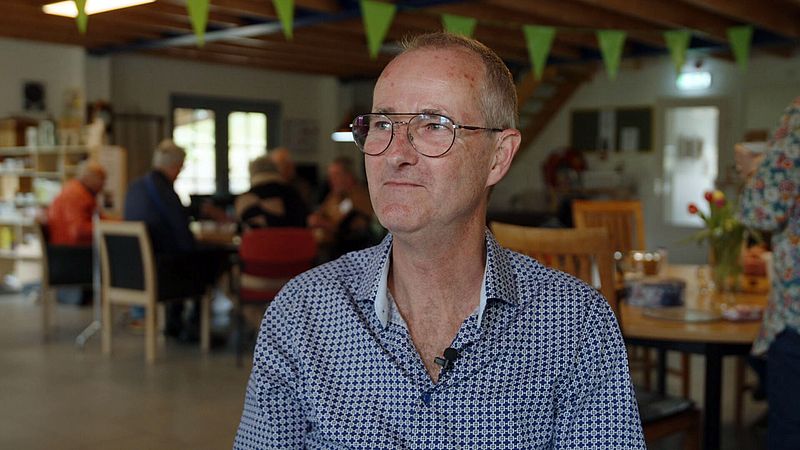Rob van Gils (59) was always perfectly healthy, until he suddenly developed a brain disorder and dementia. He fell between two stools: he could no longer work, but at the same time still felt too good for the daytime activities offered. It made him depressed.
Rob was always in the middle of life. He worked as an account manager and played in a band. On the outside you don’t see anything wrong with him, but Rob can’t work anymore. He suffers from dementia and the degenerative brain disorder Multi System Atrophy. “That has many consequences and is so confrontational,” he says.
‘Little challenge’
From one day to the next, Rob suddenly came home. “I couldn’t find the right way to spend the day or time in the region. Everything is aimed at old age and offers little challenge. There are small-scale initiatives, which all offer pretty much the same thing: clay, painting, woodworking, etcetera.”
“It is often impossible to deviate from that and you just have to like it,” he continues. “I was also not happy with the environment where the daytime activities took place. And when an activity is too far away, the health insurance is difficult about transport.”
‘See what is possible’
Out of dissatisfaction with the existing offer, Rob set up something himself so as not to fall into a depression. “You’re going to look at what you can still do.” He placed an appeal in a local newspaper and started looking for fellow sufferers to organize meaningful initiatives with them.
This resulted in the group ‘Hoofdbreakers’. They do activities together, go on outings in nature or visit a museum or local entrepreneur. “Those are the ideas,” says Rob. According to him, ‘old hobbies’ are also reviving: “I’m trying to introduce music, because I had to give up an active band life myself.”
Group with peers
The Headbreakers now meet every 2 weeks. The group consists of seven fellow sufferers, aged from 40 to 70 years. It not only concerns people with dementia, but also people with acquired brain injury and Parkinson’s.
The group includes people who are still vital, but who are no longer able to work due to a chronic condition and who do not fit in with existing daytime activities in their region. They just want to be active in society.
‘For the future’
Rob does not organize the activities alone, but receives help from the local welfare foundation and the municipality of Lingewaard. They facilitate the space and finances. “What is different from the usual daytime activities offered is that we as a group determine the activities ourselves according to everyone’s ability,” he explains.
Not everyone can participate, the condition is that people are self-reliant, provide their own transport and must be able to organize activities. Rob has a day job at the Hoofdbrekers and it costs him a lot of energy: “I want to get everything done quickly, given the time I still have left to create better local facilities for future fellow sufferers.”
15,000 young people with dementia
It is estimated that 15,000 of the 290,000 people with dementia in the Netherlands are under the age of 65. Research by the Alzheimer Nederland foundation shows that these people dissatisfied with the type and number of activities offered to them.
People who get dementia at a ‘young’ age are often still very active. They have recently worked and are therefore physically much stronger than older people with dementia. They also often have relatively young children.
‘Not the same at 85’
“It sometimes takes 4 years before the diagnosis is made,” says Julie Meerveld of Alzheimer Nederland. “And in the period preceding that, everyone thinks: dad or mom is depressed, overworked or has a burnout. Those are completely different circumstances than when you’re 85 and then get the disease.”
Meerveld also notes that daytime activities are now often focused on the supply instead of the demand for it. “Alzheimer Nederland believes that more attention should be paid to the personal interests and wishes of this still vital and active group of young people with dementia. Look especially at what is still possible. The supply must also be sufficient so that the informal carer does not fall over.”
Rest for caregiver
The foundation’s research shows that if you are physically and socially active, you will not deteriorate as quickly with the disease. “Activities that you determine yourself give structure, pleasure and meaning to life. Otherwise, boredom and depression are lurking,” explains Meerveld.
She also emphasizes that meaningful daytime activities that match the interests of the person with dementia not only make them happy. It also brings the informal carer and the rest of the family peace of mind, which relieves them of the burden and also gives them more time for themselves.
‘Change needed’
Alzheimer Nederland tries to convince organizations and employers to continue to employ young people with dementia at their employer or at voluntary organisations. In addition, young people with dementia should be encouraged to continue with what they were already doing: keep playing sports or making music.
“That requires a major change,” says Meerveld. “Many people do not know that people younger than 65 can also have dementia. The disease manifests itself differently than in the elderly. Young people, for example, suffer less memory loss, but suffer from language and behavioral problems. By training organizations to deal with this, people can continue to participate in society longer with dementia.”
2023-05-06 05:00:01
#Making #music #visiting #museums #nature #young #demented #Rob #meaningful #daytime #activities #fellow #sufferers


